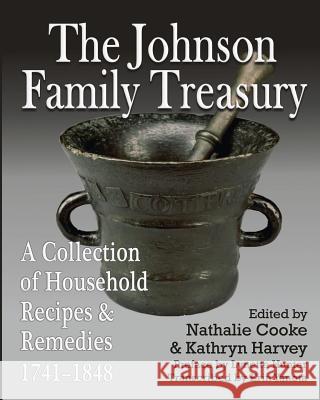The Johnson Family Treasury: A Collection of Household Recipes and Remedies, 1741-1848 » książka
The Johnson Family Treasury: A Collection of Household Recipes and Remedies, 1741-1848
ISBN-13: 9781772440089 / Angielski / Miękka / 2015 / 252 str.
The Johnson Family Treasury: A Collection of Household Recipes and Remedies, 1741-1848
ISBN-13: 9781772440089 / Angielski / Miękka / 2015 / 252 str.
(netto: 114,47 VAT: 5%)
Najniższa cena z 30 dni: 120,19
ok. 16-18 dni roboczych
Bez gwarancji dostawy przed świętami
Darmowa dostawa!
"The Johnson Family Treasury is a superb collection of previously unpublished English cookery and medicinal recipes, some dating back as far as the 1740s. Thanks to the research of those who annotated this manuscript for publication, the book also gives us deep insight into the daily lives of its multiple authors. In addition, it makes a valuable contribution to our understanding of British, Canadian, and American culinary history. Congratulations " --Andrew F. Smith, editor, The Oxford Encyclopedia of Food and Drink in AmericaCompiled over the latter half of the long eighteenth century, the receipts in this collection offer a fascinating glimpse into household technology, domestic medicine, and new foods available to the middle classes in an age of expanding colonialism. Published as facsimile copies alongside transcriptions, this treasury represents the collected knowledge of a coterie of women from at least one family. In the days before women's magazines became a popular source of information, the span of knowledge here is impressive: recipes include everything from pea soup to more exotic "floating islands," wines made from sage, damsons, cowslip, ginger, orange, cherries, currants, lemons, and raisins (plus several cures for hangovers). Equally fascinating are the medicinal receipts that cover a wide range of health problems, from "wind in the stomach" to worms, scurvy, and cancer. As Nathalie Cooke's probing introduction tells us, there are also stories here, woven into the multiple handwritings, the annotation in the margins, and use of outside sources. "It is the large number of medicinal receipts ... that renders this particular manuscript so distinctive.... Written at a time when both printed cookbooks and domestic medicine advice books were growing in popularity, but before the advent of ladies' magazines, the manuscript helps us better understand how the compilers of these books collected and shared knowledge.... An especially useful set of indexes compiled by the editors, including a complete index, an index of all the medicinal topics, and an index of those topics sorted by the main contributors, makes it very easy to use the volume in a variety of different ways." --Arlene Shaner, The New York Academy of Medicine, in Watermark: Newsletter of the Archivists and Librarians in the History of the Health Sciences











